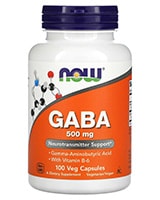

Introduction to GABA
Gamma-aminobutyric acid (GABA) stands as the central nervous system’s primary inhibitory neurotransmitter, playing a crucial role in reducing neuronal excitability throughout the nervous system. Its significance extends beyond basic brain function, impacting mental and physical health significantly.
How GABA Works in the Brain
Neurotransmitters are chemical messengers responsible for transmitting signals across synapses from one neuron to another. GABA’s primary function is to inhibit the activity of neurons, preventing overexcitement and maintaining balance within the brain’s neural network. By attaching to GABAA and GABAB receptors on neurons, GABA facilitates a reduction in neuronal responsiveness, thus playing a key role in regulating brain function and preventing disorders related to excessive neural activity.
Health Benefits of GABA
Stress and Anxiety Reduction
GABA is known for its calming effects on the brain, which are instrumental in alleviating symptoms of stress and anxiety[1]Hepsomali, P., Groeger, J. A., Nishihira, J., & Scholey, A. (2020). Effects of Oral Gamma-Aminobutyric Acid (GABA) Administration on Stress and Sleep in Humans: A Systematic Review. Frontiers in Neuroscience, 14. https://doi.org/10.3389/fnins.2020.00923. By inhibiting neural activity, GABA can reduce the physiological and psychological responses to stress, promoting a sense of calm and relaxation.
Improvement in Sleep Quality
GABA’s inhibitory effects also extend to sleep regulation[2]Xiang, T., Liao, J., Cai, Y., Fan, M., Li, C., Zhang, X., Li, H., Chen, Y., & Pan, J. (2023). Impairment of GABA inhibition in insomnia disorders: Evidence from the peripheral blood system. Frontiers in Psychiatry, 14. https://doi.org/10.3389/fpsyt.2023.1134434. By calming neural activity, it helps facilitate the onset of sleep and improves the quality of sleep, making it beneficial for individuals struggling with insomnia and other sleep disorders.
Mood Regulation
The balance between excitatory and inhibitory neurotransmitters, including GABA, is crucial for mood regulation. GABA’s role in inhibiting excessive neural activity can help alleviate symptoms of mood disorders such as depression[3]Luscher, B., Shen, Q., & Sahir, N. (2011). The GABAergic Deficit Hypothesis of Major Depressive Disorder. Molecular Psychiatry, 16(4), 383. https://doi.org/10.1038/mp.2010.120, contributing to a more stable emotional state.
Cognitive Function
GABA’s effects on the brain also include enhanced focus and concentration. By preventing the overexcitement of neurons, GABA supports cognitive functions such as attention and memory[4]Karabay, A., Balta, G., & Akyürek, E. G. (2023). Effects of gamma-aminobutyric acid on working memory and attention: A randomized, double-blinded, placebo-controlled, crossover trial. Journal of Psychopharmacology (Oxford, England), 37(6), 554-565. https://doi.org/10.1177/02698811231161579, contributing to better learning and mental clarity.
Muscle Relaxation and Recovery
Beyond its neural functions, GABA plays a role in muscle relaxation and recovery[5]Sakashita, M., Nakamura, U., Horie, N., Yokoyama, Y., Kim, M., & Fujita, S. (2019). Oral Supplementation Using Gamma-Aminobutyric Acid and Whey Protein Improves Whole Body Fat-Free Mass in Men After Resistance Training. Journal of Clinical Medicine Research, 11(6), 428-434. https://doi.org/10.14740/jocmr3817. Its inhibitory effects can help reduce muscle tension and spasms, making it a valuable aid for athletes and individuals experiencing muscle discomfort.
Sources of GABA
GABA is synthesized in the brain from glutamate, an excitatory neurotransmitter, through the action of the enzyme glutamic acid decarboxylase. While the body produces GABA naturally, certain foods and supplements can also increase its levels. Fermented foods like kimchi, miso, and tempeh are dietary sources that can boost GABA[6]Sahab, R. M., Subroto, E., Balia, R. L., & Utama, G. L. (2020). γ-Aminobutyric acid found in fermented foods and beverages: Current trends. Heliyon, 6(11). https://doi.org/10.1016/j.heliyon.2020.e05526. Additionally, GABA supplements are available for those looking to increase their intake, though their ability to cross the blood-brain barrier and effectiveness remains a topic of discussion.
GABA Supplementation
The potential benefits of GABA supplementation include stress reduction, improved sleep, and enhanced mood. Recommended dosages vary, but most supplements suggest a range from 100 to 800 mg per day. While generally considered safe, it’s important to consult with a healthcare provider before starting GABA supplements, particularly for individuals with underlying health conditions or those taking other medications. The debate on whether GABA supplements effectively cross the blood-brain barrier highlights the need for further research to fully understand their impact on health.
GABA and Medical Conditions
GABA’s influence extends to various medical conditions, particularly those involving the central nervous system. Conditions such as anxiety disorders, epilepsy, and mood disorders have been linked to imbalances in GABA levels. Medications that enhance GABA’s effects, such as gabapentin, valproate, baclofen, and benzodiazepines, are used to manage these conditions by stabilizing mood, preventing seizures, and reducing muscle spasms. Research continues to explore the therapeutic potential of GABA in treating and managing these and other health issues, highlighting the neurotransmitter’s significant role in neurological health.
Practical Tips for Enhancing GABA Levels Naturally
While supplementation is an option for increasing GABA levels, several lifestyle practices can also help enhance GABA production naturally:
- Stress Management: Engaging in relaxation techniques such as meditation, yoga, and deep-breathing exercises can help reduce stress and increase GABA levels.
- Balanced Diet: Consuming foods rich in flavonoids, such as fruits and vegetables, and fermented foods can support GABA production.
- Exercise: Regular physical activity has been shown to boost GABA levels, contributing to improved mood and cognitive function.
- Adequate Sleep: Ensuring sufficient sleep is crucial for maintaining the balance of neurotransmitters, including GABA.
- Avoiding Stimulants: Limiting intake of caffeine and alcohol can help maintain optimal levels of GABA.
Conclusion
GABA plays a pivotal role in maintaining mental and physical health by regulating neuronal activity and ensuring the brain’s excitatory and inhibitory balance. Its benefits range from reducing stress and anxiety to improving sleep and mood regulation. While GABA can be increased through diet, supplements, and lifestyle changes, further research is essential to fully understand its therapeutic potential and effectiveness in supplement form. Consulting with healthcare providers before beginning any supplementation is crucial to ensure safety and efficacy. Ultimately, the importance of GABA in the body’s neurotransmitter system underscores the significance of maintaining a balanced lifestyle for overall well-being.
Buy GABA Online Review Comparison Table
 GABA | iHerb | 100 pills (500mg) | $8.56 |  Worldwide, AU | Visit Website >> |
References
| ↑1 | Hepsomali, P., Groeger, J. A., Nishihira, J., & Scholey, A. (2020). Effects of Oral Gamma-Aminobutyric Acid (GABA) Administration on Stress and Sleep in Humans: A Systematic Review. Frontiers in Neuroscience, 14. https://doi.org/10.3389/fnins.2020.00923 |
|---|---|
| ↑2 | Xiang, T., Liao, J., Cai, Y., Fan, M., Li, C., Zhang, X., Li, H., Chen, Y., & Pan, J. (2023). Impairment of GABA inhibition in insomnia disorders: Evidence from the peripheral blood system. Frontiers in Psychiatry, 14. https://doi.org/10.3389/fpsyt.2023.1134434 |
| ↑3 | Luscher, B., Shen, Q., & Sahir, N. (2011). The GABAergic Deficit Hypothesis of Major Depressive Disorder. Molecular Psychiatry, 16(4), 383. https://doi.org/10.1038/mp.2010.120 |
| ↑4 | Karabay, A., Balta, G., & Akyürek, E. G. (2023). Effects of gamma-aminobutyric acid on working memory and attention: A randomized, double-blinded, placebo-controlled, crossover trial. Journal of Psychopharmacology (Oxford, England), 37(6), 554-565. https://doi.org/10.1177/02698811231161579 |
| ↑5 | Sakashita, M., Nakamura, U., Horie, N., Yokoyama, Y., Kim, M., & Fujita, S. (2019). Oral Supplementation Using Gamma-Aminobutyric Acid and Whey Protein Improves Whole Body Fat-Free Mass in Men After Resistance Training. Journal of Clinical Medicine Research, 11(6), 428-434. https://doi.org/10.14740/jocmr3817 |
| ↑6 | Sahab, R. M., Subroto, E., Balia, R. L., & Utama, G. L. (2020). γ-Aminobutyric acid found in fermented foods and beverages: Current trends. Heliyon, 6(11). https://doi.org/10.1016/j.heliyon.2020.e05526 |

Leave a Reply